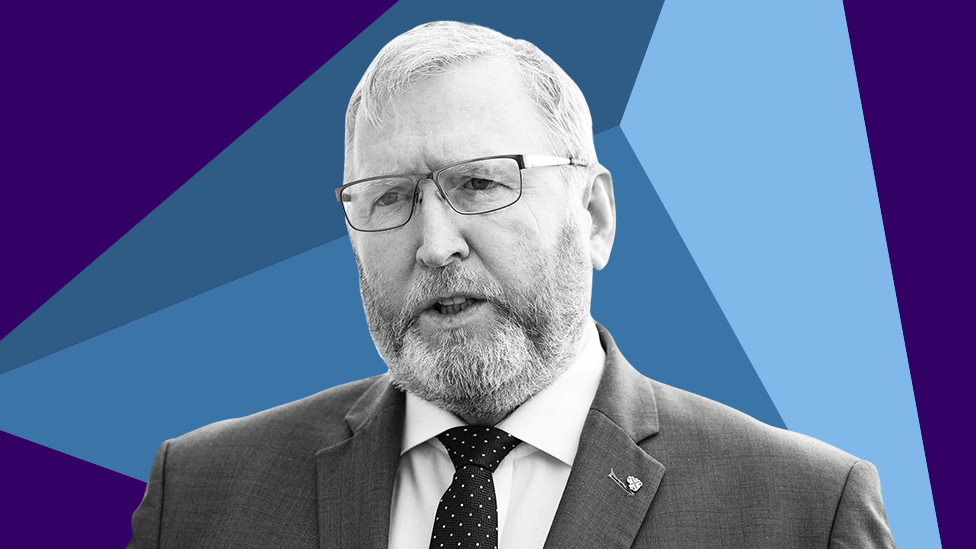Who is UUP leader Doug Beattie?

- Published
Doug Beattie: The basics
Date of birth: 13 October 1965
Family: Married Margaret in 1987; two sons
Education: Left school at 16 with no formal qualifications, trained as a soldier at Taunton in Somerset
Career: Served in the Army from 1982-2009, commissioned officer from 2004-2009. Ulster Unionist Party assembly member since 2016 and leader since 2021. Author of two books
Parliamentary constituency: None, represents Upper Bann in the Northern Ireland Assembly
Who is he?
When Doug Beattie took over as leader of the Ulster Unionist Party (UUP) in May 2021 he became the third leader of the party in just over four years.
The party has experienced a tough time in elections since it was surpassed by the Democratic Unionist Party (DUP) at the Stormont poll in 2003 and the Westminster election of 2005.
But in the months following Mr Beattie's election as leader, the UUP overtook the DUP in opinion polls.
The "Beattie bounce" did not last and the UUP subsequently had challenging local and assembly polls - but with some high-profile candidates this time around, Mr Beattie still has hopes of reviving his party's fortunes.
What did Doug Beattie do before politics?
Mr Beattie was born on an Army base in Hampshire in 1965, where his father was serving in the Royal Ulster Rifles.
The family later moved back to Portadown in County Armagh but Mr Beattie followed in his father's footsteps by joining the Royal Irish Rangers at the age of 16, going on to serve in Kosovo, east Africa and Iraq and rising to the rank of regimental sergeant major.
In 2005 he was commissioned as an officer at the rank of captain and served three tours of duty in Afghanistan.
For his actions in fierce fighting over several days in September 2006 he was awarded the Military Cross - the third-highest award for gallantry in the face of the enemy.
He has written two books about his experiences in Afghanistan.
When did he get involved in politics?
After retiring from the Army he joined the UUP and was elected as a councillor in 2014 before winning a seat in Upper Bann in the assembly election two years later.
There was speculation he would stand to succeed Mike Nesbitt as UUP leader in 2019 and although he backed Steve Aiken instead, he would eventually take over from Mr Aiken in 2021.
He became embroiled in controversy in early 2022 when he made a joke about the wife of the former DUP leader Edwin Poots, which Mr Poots said had demeaned women and specifically had demeaned his wife.
Mr Beattie apologised, but a number of historical tweets subsequently emerged - many of which contained derogatory comments about women.
He apologised again, said he was "deeply ashamed" and managed to stay in place as UUP leader.
Where is the UUP at the moment?
The UUP has had a tough time of it in Westminster in recent elections. In 2010 it failed to win any seats for the first time since Northern Ireland was created.
In 2015 the party won two, but both MPs were defeated in 2017 and no candidates were successful in 2019 either.
At the last assembly elections in 2022 the UUP won nine seats, down from 10 at the previous election, although this was enough to ensure it remained entitled to one ministerial post at Stormont.
The 2023 council elections were also bruising as the party lost 21 seats to finish with a total of 54.
Mr Beattie has two high-profile candidates which will attract plenty of his attention on the campaign trail.
One is Robin Swann in South Antrim, while in North Down retired Army officer Tim Collins is hoping to unseat Alliance's Stephen Farry.
He will also face questions about pacts - where one party stands down to benefit another.
These are common in Northern Ireland where one of the two unionist or nationalist parties stands aside to avoid splitting the vote.
In Fermanagh and South Tyrone, Mr Beattie said he was opposed to a pact and the DUP subsequently announced it would not run its own candidate.
There is likely to be pressure on the UUP to stand aside in Belfast North where the DUP was edged out by Sinn Féin last time around.
